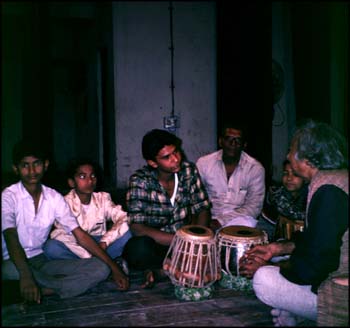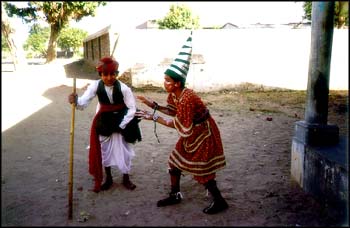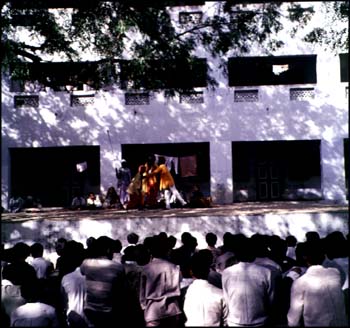Training
In earlier times, nine year old boys of the Taragala Community joined the Bhavai group of their fathers or uncles. They observed their elders in the evening performances. During the day, they listened to conversations about last night's show, studied songs, dances and use of costume from their elders. If the senior members of the company found them suitable to perform in public, they gave them small roles such as Chataki in the Juthan vesha (play). Around the age of puberty, if a boy's voice and body was suited to do a major female character, he might begin to play one such as Tejan in the Zanda Zulan vesha. Otherwise, they trained for male comic roles such as Juthan or heroic roles like Zanda Zulan. If a boy's father was the leader of a company, he would inherit that position.
In this century, parents are not enthusiastic about their sons becoming Bhavai actors because of economic pressure. Instead they educate their sons for better paying jobs. As a result, the standard, strength, and training of Bhavai has gone down in quality. In 1980, Kailash Pandya organized a Bhavai Mela (festival) at Darpana Academy in Ahmedabad to make urban people aware of the rural traditional form and to impress its importance on the government of Gujarat. Thanks to the continued efforts and dedication of Mr. Pandya, The Gujarat government started a Bhavai training school in Visinagar in the northern part of the state where the Taragala Community has lived for over seven hundred years. Kailash Pandya created a three year program for bhavai training which included dance, music, songs, acting styles, veshas and modern theatre techniques. Thirty twelve year old boys are selected each year for the Bhavai program after an interview. They are given stipends for their lodging, boarding and educational fees; a major incentive for the families of these boys. They study Bhavai in the mornings and evenings and go to their regular school during the day. After a year's training, they begin to perform both traditional as well as new veshas on themes such as education, personal health, and morals. They also create veshas based on stories read in the regular school program to help explain the text. Veteran Bhavai artist Chimanlal Nayak is the principal instructor of the Visanagar school. He passes on the Bhavai traditions to new generations to help revive and improve this valuable cultural theatre form.



